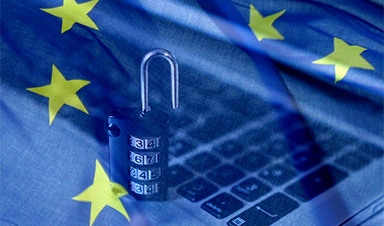From a blog by VALID advisor Christian Sillaber, Senior Researcher on IT-Security
The European Union’s General Data Protection Regulation (GDPR) came into effect on May 25, 2018. It is already clear that the new law, which is in many respects ground-breaking, is struggling to keep up with the pace of technological change. If this issue is not addressed, the GDPR will undermine citizens’ ability to use blockchain.
The core of the problem is that, in addition to the explicit declaration of the rights of the data subject (access to data, data portability, right to erasure, right to correction etc.), the GDPR also mandates that data controllers and processors abide by the principle of “data protection by design and default”. This means designing services and software with privacy as a foundational consideration rather than as an afterthought or add-on. The implied design requirements and goals seem to be at odds with the fundamental ideas behind blockchain and other emerging distributed ledger technologies — in particular transparency, immutability and egalitarian access to the data.
The GDPR applies to the processing of personal data (Art. 2 para. 1 GDPR), that is, any information relating to an identified or — by the use of additional information — identifiable person (Art. 4 para. 1 GDPR). Although the cryptographic identities used by most participants of public permissionless distributed ledger systems are not directly linked to identified natural persons, it is — under certain circumstances — possible to identify participants through additional information (e.g. correlation of the person’s activities with third party data). Therefore, data stored and processed in most public, permissionless blockchain systems should be considered personal data. Little doubt also remains that territorial applicability can also be established for most distributed ledger systems, as they are either (partially) operated from within the EU or are actively used to process data from data subjects located in the EU.
Public, permissionless distributed ledger systems enable their participants to maintain a public database without the need for a trusted central authority or mutual trust. Any participant may enter or leave the system at any time and, therefore, access the data of the ledger at any time.
Image Credit: Valid
News This Week
Scientists study lipids cell by cell, making new cancer research possible
Imagine being able to look inside a single cancer cell and see how it communicates with its neighbors. Scientists are celebrating a new technique that lets them study the fatty contents of cancer cells, [...]
Antibiotic Breakthrough: Revolutionary Chinese Study Paves Way for Superbug Defeating Drugs
New research reveals that fluorous lipopetides act as highly effective antibiotics. Bacterial infections resistant to multiple drugs, which no existing antibiotics can treat, represent a significant worldwide challenge. A research group from China has [...]
Signs of Multiple Sclerosis Show Up in Blood Years Before Symptoms Appear
UCSF scientists clear a potential path toward earlier treatment for a disease that affects nearly 1,000,000 people in the United States. By Levi Gadye In a discovery that could hasten treatment for patients with multiple [...]
Advanced RNA Sequencing Reveals the Drivers of New COVID Variants
A study reveals that a new sequencing technique, tARC-seq, can accurately track mutations in SARS-CoV-2, providing insights into the rapid evolution and variant development of the virus. The SARS-CoV-2 virus that causes COVID has the unsettling [...]
No More Endless Boosters? Scientists Develop One-for-All Virus Vaccine
End of the line for endless boosters? Researchers at UC Riverside have developed a new vaccine approach using RNA that is effective against any strain of a virus and can be used safely even by babies or the immunocompromised. Every [...]
How Are Hydrogels Shaping the Future of Biomedicine?
Hydrogels have gained widespread recognition and utilization in biomedical engineering, with their applications dating back to the 1960s when they were first used in contact lens production. Hydrogels are distinguished from other biomaterials in [...]
Nanovials method for immune cell screening uncovers receptors that target prostate cancer
A recent UCLA study demonstrates a new process for screening T cells, part of the body's natural defenses, for characteristics vital to the success of cell-based treatments. The method filters T cells based on [...]
New Research Reveals That Your Sense of Smell May Be Smarter Than You Think
A new study published in the Journal of Neuroscience indicates that the sense of smell is significantly influenced by cues from other senses, whereas the senses of sight and hearing are much less affected. A popular [...]















Leave A Comment